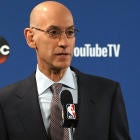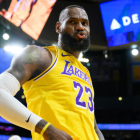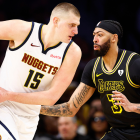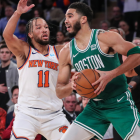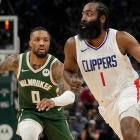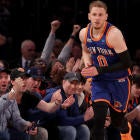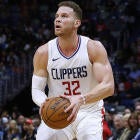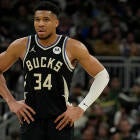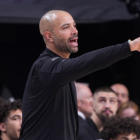The coronavirus has caused the shutdown of sports leagues across the world, including the NBA, which was one of the first to act -- at least stateside. A week removed from the decision to shut down following Rudy Gobert's positive test for the virus, NBA commissioner Adam Silver sat down for a lengthy televised interview with ESPN's Rachel Nichols on Wednesday night.
During the interview, he discussed a number of topics, including what went into the league's decision to stop play, why NBA teams are being tested before regular civilians, how the league can play a unique role in society during these troubling times, and finally, whether or not they'll be able to finish this season.
Silver on how the NBA made the decision to suspend the season:
It's hard to believe it's only been a week since the NBA decided to call off the Jazz-Thunder game, and then suspend the remainder of the season. At this point, based on what we know now, it seems obvious that the league made the correct decision. But at the time, things were much more murky on the illness and what we should be doing to prevent it from spreading.
On Wednesday, Silver took us step-by-step through their thought process and decision making:
"Fortunately I've had the benefit of a few things. One, we have a large presence in China -- we have about 200 of our employees based in China, so we've been living this at the league office since mid-January. So I think that we've been on alert, at least to what the consequences could be if the coronavirus spread to the United States, and clearly as the weeks have gone on, as it's gone through Europe, the sense was it was coming here, and there was no reason to believe that this virus knew boundaries or borders of any kind and that it was gonna come to impact the United States in a similar way as China and Europe.
"So that day, last Wednesday, we had a full board meeting, it was done by conference call, and we were discussing the options. And the options were, essentially -- I mean, there were some people who were asking if we could continue to play with fans. Because remember, this was only a week ago, most jurisdictions were not even recommending that we play without fans. It wasn't until that day, last Wednesday, that Dr. [Anthony] Fauci, in response to a question at a Congressional House Oversight Committee -- it was only in response to a question, when asked, should the NBA, and I think he was asked about one of the college leagues as well, whether they should continue playing with fans, he said, 'I recommend at this point they play without fans.' Not that we shut down the league. So that recommendation came a week ago.
"So we had our board meeting that day. Again, there were some who were saying, just because there was so much uncertainty, and they were waiting for the government to give them a directive, frankly, about what they should be doing, I'd say most teams broke down into two categories: those who felt we should see if we can play our games without fans, and those who were saying let's take a hiatus. It goes to the state of mind at that time, nobody had a sense of how long it could be, but I think a hiatus was a notion of a shorter period. What we were doing at the league office, the notion on that call was not to take a vote, but to take in all the information, and then go back to the public health experts who had been advising us -- namely Dr. Vivek Murthy, [who served as] surgeon general under President Obama, and Dr. David Hough, who's a researcher here in New York affiliated with Colombia University.
"So I had the benefit of the views of 30 teams, and lots of internal discussions in the league office. So when we learned that night, I think it was around 8 o'clock New York time that Rudy Gobert had tested positive. Again, he had already been separated from the team, but the Utah Jazz and Oklahoma City Thunder were on the court, literally about to tip, fans in the arena. And then, in consultation with Clay Bennett, who's the principal owner of the Oklahoma City Thunder, and other doctors and public health officials in Oklahoma City, we made, in essence, a split second decision that we should call the game. But we wanted to be careful that we didn't overly alarm 19,000 people who needed to exit the arena in an orderly way.
"So we waited to make the announcement until the people were out of the building. But the decision then, in retrospect, most would argue events made it for me -- but it seemed in that moment the right thing to do was to suspend the operation of the season. The issue then came up in terms of games that, some had already started, and there was a game out in Sacramento with New Orleans, and we made a decision there. I was on the phone with Vivek Ranadive, the principal owner there in Sacramento, that one of the officials who had officiated one of the prior games involving the Utah Jazz was also officiating that game. Then the question was could that game proceed with two officials instead of three. And what's so remarkable is as people are listening to this now only a week later, all these decisions seem completely obvious based on the social distancing protocol we've all learned in the past few days. But in that moment it seemed there was at least something to think about, but the thought process was about two minutes long, and then we called that game as well."
Silver on whether the NBA can finish the season:
The obvious question now, is whether or not the NBA can finish this season. Following a call with the former surgeon general, NBA owners are hopeful of restarting the season before July, according to a report from Adrian Wojnarowski of ESPN.
At this point we really don't know what the future holds, but Silver seemed to echo those optimistic views. While he was cautious in saying he doesn't have any set time frame or picture of what things would look like, Silver did say he believes the league can "salvage" something from this season:
"Rachel, I honestly don't know, just because I don't have a good enough sense of how long a period this is gonna be. As I said, just the fact that we were using the word 'hiatus' just a week ago, and that sort of the implication was a short amount of time. I think I said last Thursday not less than 30 days, just to give some guidance to our teams and our players, but at this point I really don't know.
"I don't, I'm optimistic by nature, and I want to believe we're gonna be able to salvage at least some portion of the season. Again, I'd say we've done new and creative things in the past, we experimented with this year's All-Star Game with a unique ending, we've talked about play-in tournaments for going into the playoffs, there may be other things we can do with the format. I know I've heard from a lot of our players. It's been less than a week, they're going stir crazy, they want to play, they want to compete. Players, as you know, unlike a lot of us in our positions can just go back to what we were doing, but every player is fighting something that's un-winnable, and that's the aging process. So a lost year, or lost portion of the season in their career is very different than other people. We're gonna try by every means we can to play basketball again, but the safety and health of our players and fans is first, so I don't want to speculate more than that. That will be the condition of how much we can play -- when public health officials give us the OK."
Silver on what play may look like when they return, and in the meantime:
Assuming a best-case scenario where the league is able to return to play later this summer, the next question is, OK, what does that look like? It seems pretty clear that because of the lengthy delay, they aren't going to be able to just pick up where they left off with the regular season.
There's going to have to be an altered format, whether that's going straight into the playoffs based on the current standings, holding a play-in tournament to determine some of the final spots, etc. Things are going to be different, and even Silver doesn't have the answers now.
Perhaps the most interesting point he made in this segment, though, was about the possibility of getting some players together to play a game or competition in the meantime. He suggested it could be for charity, or just to improve the morale of everyone around the country who is stuck inside and looking for something to cheer them up during troubling times:
"I'm looking at three different things here. One is, when can we re-start and operate as we've known it -- 19,000 fans in buildings and sort of that's one set of criteria. Option two is should we consider re-starting without fans, and what would that mean? Because presumably if you had a group of players, and staff around them and you could test them, and you could follow some protocol, doctors, health officials may say it's safe to play. So that's sort of the second set of circumstances. The third option we're looking at now -- and I'd say all suggestions welcome -- is that in the beginning of this interview I mentioned the impact of the national psyche of having no sports programming on television. And one of the things we've been talking about is are there conditions in which a group of players could compete. Maybe it's for a giant fundraiser, or just for the collective good of the people. That you take a subset of the players and is there a protocol where they can be tested and quarantined and isolated in some way, and then they could compete in some way. Just, again, because people are stuck at home, and I think they need a diversion, they need to be entertained."
Silver on the role the league can play in mitigating the crisis
The coronavirus is obviously having a big impact on the world of sports, but there are far bigger issues at play for people across the country and the world. We need to take pretty drastic measures in order to slow the spread of the illness, and getting that message across to people is difficult.
Silver says the NBA can play a role in that process, but did acknowledge it's a tricky line to toe in terms of keeping people informed, while making sure they don't disregard the information, or get too disturbed by it:
"In terms of the last four from the Brooklyn Nets I honestly was not all that surprised. Based on what we're hearing, and given the lack of testing that's available, my sense is especially in the New York Area, if you took any random group of New Yorkers, it would be increasingly likely that there are gonna be some positive tests. On top of that, and this is what led to some of the testing in the first place, you could put our players in the category that some people would refer to as 'super spreaders.'
"They are young players who are working in close proximity to each other, they are traveling at great frequency, they are regularly in large groups, including the public, and for the young cohort in particular, a large number of them are asymptomatic. And if they do have symptoms they're relatively mild. So what's happening with that group is that until government and all levels started to clamp down, because it wasn't affecting them so much personally, they might not have understood sort of the magnitude of the crisis in our country.
"Some of the conversations I've had with our players. And I know it cuts both ways. When people see Donovan Mitchell on social media or doing public service announcements for us reminding them of the protocol. When he says 'hey, I'm good, I'm healthy,' we have to be careful that other young people don't see that and say, 'hey, he tested positive, it's no big deal.'
"What I've said directly to some players, the issue is, you hug grandma, frankly you could be putting her in jeopardy. We're learning more and more about COVID-19 all the time, but it's particularly lethal for older people and people with underlying conditions. So I think that in the midst of this crisis, I think there's a particular role that the NBA can play in terms of getting the message out, especially to younger people."
Silver on NBA players getting tested before others
One of the big problems facing the country right now is a lack of tests available for the coronavirus. Thus, there's been some controversy over the fact that multiple NBA teams have been tested in full, while regular people suffering symptoms off the illness are turned away from hospitals without being tested.
In response to the Brooklyn Nets being tested earlier this week, New York City mayor Bill de Blasio tweeted, "We wish them a speedy recovery. But, with all due respect, an entire NBA team should NOT get tested for COVID-19 while there are critically ill patients waiting to be tested. Tests should not be for the wealthy, but for the sick."
On Wednesday night, Silver responded to that, and similar criticisms:
"I, of course, understand his point and that it's unfortunate we're at this position as a society where it's triage when it comes to testing. And so the fundamental issue obviously is that there are insufficient tests. I'd only say in the case of the NBA we've been following the recommendations of public health officials.
"I mean, let me begin with the situation in Oklahoma City last Wednesday night: The Utah Jazz did not ask to be tested. The Oklahoma public health official there on the spot not only required that they be tested, but they weren't allowed to leave their locker room, which was for at least four hours after the game where they had to stay, masks on, in the locker room. They couldn't leave until the health authorities had tested them. so, I mean, that was our first case. And then what followed when we then had an additional positive test the next day, the protocol then followed that we then follow with, again, health officials' and our doctors' recommendations that we then looked at essentially that group of teams that were most proximate to the initial team that had tested positive. And then the circle expanded from there.
"And so I understand it, but we've had eight NBA teams, full teams that have been tested now, and members of other teams that were showing symptoms. And, again, I understand from a public health standpoint why some people have reacted the way they did, but I'd say from an NBA standpoint we were following directives."













